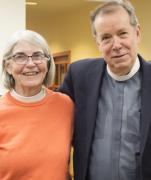Brief history
The word “deacon” comes from the Greek language and the biblical concept of diakonia, commonly defined as servant ministry, particularly to the poor, the sick and the oppressed.
Jesus is the model for the servant leadership, and a deacon is called to exercise servant leadership in a variety of ways, including encouraging and enabling others to serve. A deacon has one foot in the world and one foot in the church.
The church has had deacons since New Testament days. Deacons are referred to in 1 Timothy 3, and familiar deacons from history include Stephen, Vincent, Laurence, Alcuin, Francis of Assisi and Nicholas Ferrar of Little Gidding.
The Diocese of Massachusetts has been ordaining deacons since 2001. (Deacons are different from transitional deacons, who are called to the priesthood and who are, in accordance with the canons of the church, first ordained a deacon and then, after a time, ordained to the priesthood).
Diaconal ministry is:
• servant leadership
• serving in the name of Jesus
• serving under the direction of the bishop
• serving those in need
• being a student of Scripture
• interpreting the Gospel to the world
• telling and interpreting the needs of the world to the church
• encouraging and enabling others to serve
• a ministry of social care
The role of the deacon
The diaconate is one of three distinct orders of ordained ministry in the Episcopal Church—there are deacons, priests and bishops—and an individual becomes a deacon by being ordained by a bishop after completing a course of study and formation. (Some other denominational traditions use the title “deacon” for lay persons elected to responsible governing positions in their churches.)
The Book of Common Prayer provides roles for deacons within liturgies and defines the responsibility of deacons in serving others in the name of Christ and in leading and training lay people in such service. Many deacons define their true ministry as being outside the four walls of the church itself, often at the edges of society and our comfort zones.
The charge at the ordination of a deacon (The Book of Common Prayer, page 543):
"In the name of Jesus Christ, you are to serve all people, particularly the poor, the weak, the sick and the lonely. As a deacon in the Church, you are to study the Holy Scriptures, to seek nourishment from them and to model your life upon them. You are to make Christ and his redemptive love known, by word and example, to those among whom you live, and work and worship. You are to interpret to the Church the needs, concerns and hopes of the world. You are to assist the bishop and priests in public worship and in the ministration of God's Word and Sacraments, and you are to carry out other duties assigned to you from time to time. At all times, your life and teaching are to show Christ's people that in serving the helpless they are serving Christ himself."
Formation
Please visit the Ordained Vocations page and specifically the Ministry Discernment Handbook posted there for more information.
The Ven. Patricia Zifcak, Archdeacon for Formation and Pastoral Care, says of the formation process: "Deacons in the Diocese of Massachusetts are as diverse as skills, interests and personalities allow. We are called from many professions to serve God in the world. Using all that we know from our life and work experiences and with a deep desire to serve the needs of the world, deacons are the bridge between the church and the community in which it resides. In our formation, we receive excellent academic and liturgical preparation for our role in the church. Equally important, we create and sustain a community of deacons that continues to grow with every class entering formation. If you find yourself responding to the needs of your community and the world and wondering how to encourage your church to respond, you may be called to the diaconate. Please use the link provided above to learn more about the discernment process of the diocese."
Parish assignment process
Deacons serve under the direction of the bishop, and are assigned to congregations and communities for service. The length of this assignment is a function of the vitality and goals of the ministry, and is typically for three years.
Clergy and lay leadership of congregations seeking to have a deacon assigned with them are required to submit a Needs Assessment (attached below as a PDF). This assessment is intended to start a conversation about the needs, hopes and plans of the community, and provide insight into talents and gifts needed by the deacon to make the assignment a success. Because there are far more congregations seeking a deacon than there are deacons available for assignment, not every congregation seeking a deacon will be assigned one.
Contacts
Archdeacons are appointed to assist the bishop with canonical requirements of formation, deployment, supervision and support of those ordained to and preparing for ordination to the diaconate. Currently serving as archdeacons:
The Ven. Christiaan Beukman
cbeukman@diomass.org
The Ven. Patricia Zifcak
pzifcak@diomass.org
508-314-4957

